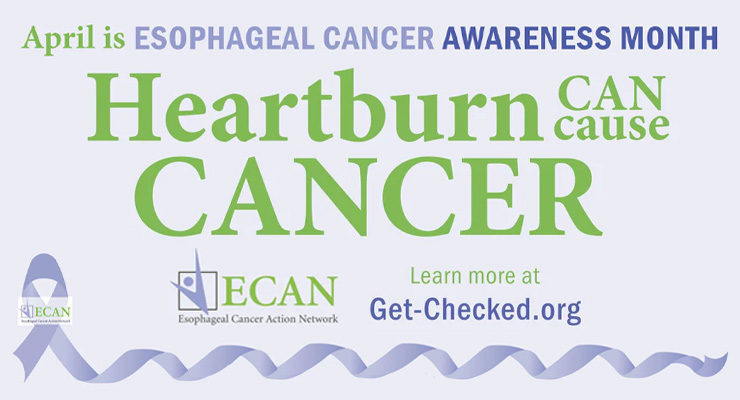Chronic heartburn linked to one of the fastest-growing cancers in America
- Category: Cancer, Primary Care
- Posted On:
- Written By: Boulder Community Health

According to the National Cancer Institute, esophageal cancer is one of the fastest-growing cancers in America. In fact, researchers found that, among those ages 45 to 64, the esophageal cancer rate nearly doubled from 2012 to 2019.
While treatable, esophageal cancer is rarely curable and one of the deadliest cancers.
April is Esophageal Cancer Awareness month, making it a good time to learn the signs and what you can do to reduce your risk.
About esophageal cancer
Early on, esophageal cancer typically has no signs or symptoms and is usually caught in the late stages. The 5-year relative survival rate for those with disease that has spread to surrounding tissues or organs and/or the regional lymph nodes is 26%. If it has spread to distant parts of the body, the relative survival rate is 6%.
The most common type of esophageal cancer is adenocarcinoma, typically the result of untreated constant heartburn or gastroesophageal reflux disease (GERD). GERD occurs when strong stomach acid and enzymes that help digest food escape from the stomach up into the lower part of the esophagus, damaging its inner lining.
The second most common type, squamous cell carcinoma, usually occurs in those who have a history of heavy smoking or alcohol consumption.
Risk factors
Several factors can affect your risk of esophageal cancer, including:
- GERD - This risk seems to be higher in people who have more frequent symptoms.
- Barrett's Esophagus – A precancerous condition, Barrett’s Esophagus occurs if GERD goes on for a long time, causing the cells that normally line the esophagus to be replaced with gland cells. These gland cells usually look like the cells that line the stomach and the small intestine, which are more resistant to stomach acid. About 5% to 10% of people with GERD develop this condition.
- Smoking
- Heavy consumption of alcoholic beverages
Other risk factors include older age, being male, and being African American.
What can you do to reduce your risk?
One of the most effective ways to prevent esophageal cancer is to seek treatment for GERD.
Your doctor may recommend taking medicine such as an antacid, H2 blocker or proton pump inhibitor (PPI). These are available over the counter and by prescription.
Some lifestyle changes can also help with GERD:
- Eat smaller meals.
- Avoid snacking before bedtime.
- Raise the head of your bed by 6 inches.
- Cut back on fatty and acidic foods, alcohol, chocolate, peppermint, and coffee.
- If you smoke, quit.
- If you are overweight, weight loss will help.
- Avoid tight fitting clothes.
- Drink alcohol in moderation, if at all.
Signs of esophageal cancer
Talk with a doctor if:
- You have more than occasional heartburn symptoms.
- You have experienced heartburn in the past, but the symptoms have gone away.
- You have any pain or difficulty swallowing.
- You have a persistent, unexplained cough.
- You have been speaking with a hoarse voice over several weeks.
- You have a persistent, unexplained sore throat.
- You cough or choke when you lie down.
Schedule an appointment
If you would like to learn more about esophageal cancer or treatments for GERD, contact our affiliated providers with Gastroenterology of the Rockies at 303-604-5000.